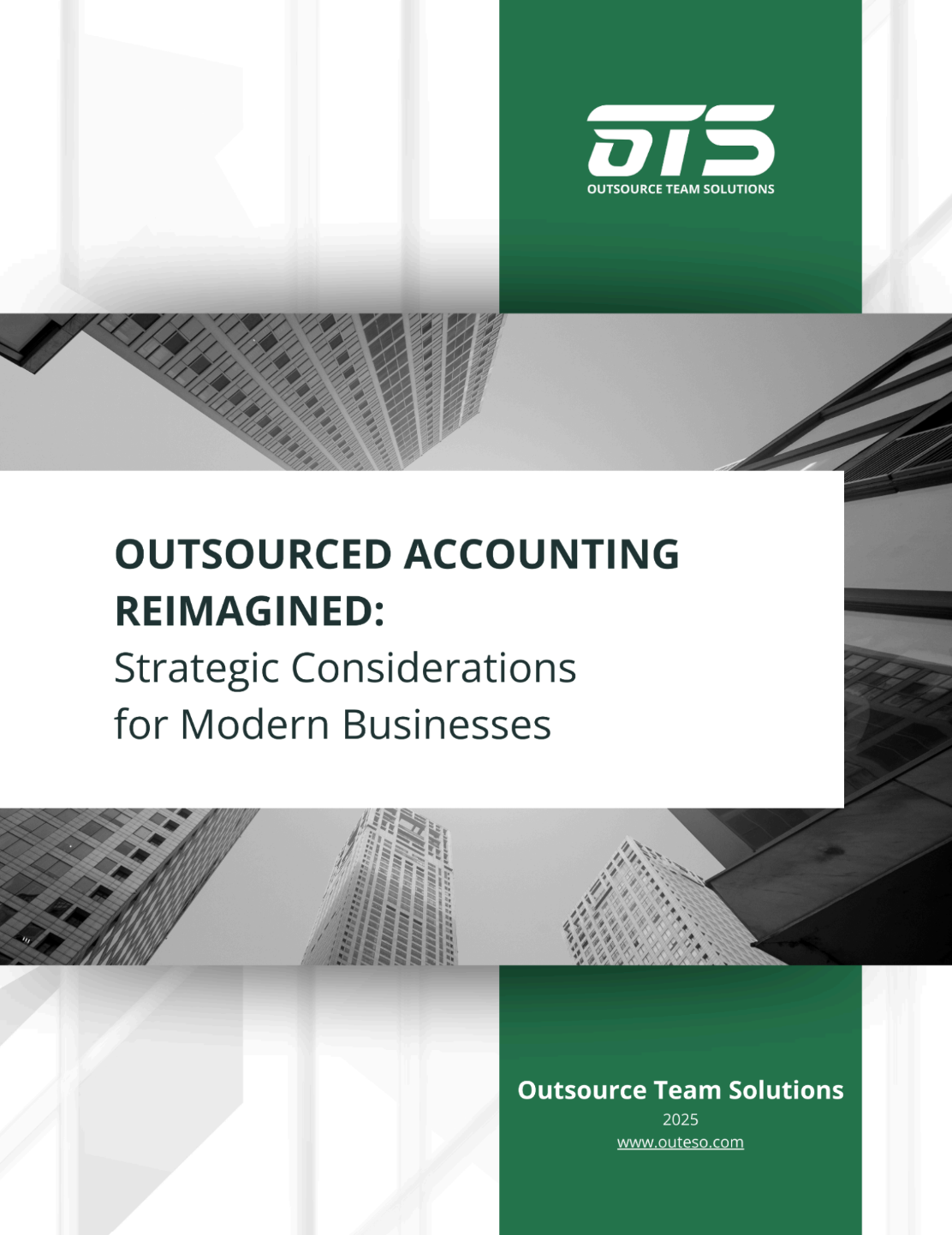Why Successful Firms Are Making the Switch to Outsourced Accounting: A Cost-Effective Solution
- Outsource Team Solutions
- Jul 8, 2025
- 4 min read

Picture this: You're reviewing your quarterly expenses and notice your accounting department costs have somehow ballooned by 35% over the past year. Sound familiar? You're not alone. Many medium-sized businesses underestimate their true accounting department expenses.
The traditional mindset of keeping financial operations close to home has deep roots in business culture. Many executives believe that proximity equals control, and control equals better outcomes. However, this conventional wisdom is being challenged by a new generation of data-driven leaders who are discovering that the real cost of maintaining an internal accounting function extends far beyond the obvious line items.
The True Price Tag: Hidden Expenses of Accounting Talent
Compensation Costs
While salary figures are transparent, the comprehensive cost of accounting personnel creates a financial web that's far more complex than most business owners realize. A senior accountant earning $78,000 annually actually costs your organization approximately $94,000 (+~20%) when you factor in the full spectrum of employment-related expenses.
Consider payroll taxes, which add roughly 7.65% to your base compensation costs. Workers' compensation insurance and state-specific employment taxes can push this figure even higher. Beyond these mandatory expenses, competitive benefits packages have become essential for talent retention.
Health insurance premiums alone can add $15,000-$20,000 per employee annually. Retirement plan contributions, typically ranging from 3-6% of salary, represent another substantial ongoing expense. Professional liability insurance, continuing education allowances, and performance bonuses further inflate the true cost of each team member.
Knowledge Gaps and Skill Development Challenges
The accounting profession evolves rapidly, with new regulations, tax law changes, and reporting requirements emerging regularly. The Tax Cuts and Jobs Act alone required significant retraining for accounting professionals, with many organizations spending on employees’ continuing education and certification maintenance.
Professional development extends beyond regulatory compliance. Advanced analytics, automation tools, and financial forecasting capabilities require specialized training that can be both expensive and time-consuming. The opportunity cost of having key personnel away from daily operations for training purposes represents an often-overlooked expense category.
Moreover, skill gaps within internal teams can lead to costly errors or missed opportunities. A single error in tax filing or a compliance oversight can lead to penalties that far exceed the cost of professional services, in addition to the time and resources needed for remediation.
Recruitment and Retention: The Hidden Hiring Costs
The current talent market for accounting professionals has created unprecedented challenges for businesses trying to build internal teams. The average time to fill accounting positions has increased to 56 days, during which existing staff must manage additional workloads or implement temporary solutions.
Recruitment costs extend far beyond job posting fees. Background checks, skills assessments, and interview time for multiple stakeholders can easily reach $15,000-$25,000 per hire, in addition to potential relocation expenses. When factoring in the learning curve for new employees and the productivity loss during transition periods, the true cost of turnover becomes even more substantial.
Industry data indicate that accounting professionals change jobs every 2.8 years on average, resulting in regular recruitment cycles that continuously drain resources and disrupt operational continuity.
Accounting Excellence Through Strategic Partnerships
Modern outsourced accounting services have evolved well beyond basic bookkeeping functions. Today's leading providers offer a comprehensive partnership that can transform how businesses manage their accounting operations and strategic planning.
Rather than merely processing transactions, outsourced partners provide institutional expertise that includes best practices from various industries and client situations. This transfer of knowledge can uncover opportunities for process improvement, cost reduction, and strategic advantage that internal teams might never discover.
Business growth rarely follows predictable patterns, and accounting needs can vary significantly based on seasonal cycles, expansion plans, or market conditions. Outsourced services offer flexible capacity that can increase or decrease based on actual demands rather than fixed staffing commitments.
Gain Advantage with the OTS Cost Savings Calculator
Understanding the financial impact of your accounting decisions requires accurate cost analysis that considers all direct and indirect expenses. Outsource Team Solutions (OTS) offers a Cost Savings Calculator that provides a comprehensive framework for evaluating the true cost differential between internal and outsourced accounting operations.
This analytical tool factors in often-overlooked expense categories. This allows you to input your current accounting staffing structure, compensation, and operational parameters to generate:
Projected cost savings
Long-term profitability projections based on optimized financial operations
The calculator helps you identify and evaluate the optimal balance between cost savings and service needs for your specific situation.
Benefits of Outsourced Accounting
Direct Cost Reduction
Most organizations identify cost savings ranging from 30% to 60% upon transitioning from internal accounting operations to outsourced services. These savings arise from the elimination of fixed personnel costs, a reduction in investments related to technology infrastructure, and the acquisition of more efficient processes accompanied by automation tools.
Operational Efficiency
Outsourcing accounting functions enables firms to sustain strategic focus throughout the year. By delegating routine bookkeeping and accounting responsibilities to external parties, accounting professionals are able to devote increased time to fostering client relationships, discovering new business opportunities, and providing specialized advisory services that command premium fees.
Strategic Value Opportunities
Beyond direct cost savings, outsourced accounting partnerships often generate additional value through improved financial processes, enhanced reporting capabilities, and strategic insights that support better business decision-making.
Access to advanced analytics and benchmarking data can identify opportunities for working capital optimization, expense reduction, and revenue enhancement that more than offset the service provider's fees. Many businesses discover that the strategic value creation exceeds the cost savings by a significant margin.
The Future of Financial Operations: Embracing Strategic Partnership
The evolution of accounting operations is moving toward collaborative partnerships that combine the efficiency of outsourced services with the strategic insights necessary for competitive advantage. Organizations that embrace this transformation position themselves for superior financial performance and operational flexibility.
As technology continues to advance and business complexity increases, the advantages of partnering with specialized accounting service providers will only become more pronounced. The question isn't whether to consider outsourcing, but rather how quickly you can implement a strategic partnership that drives both cost efficiency and competitive advantage.
Making informed decisions about your accounting operations requires a comprehensive analysis of all costs, risks, and opportunities associated with different approaches. By understanding the true financial impact of internal versus outsourced accounting, you can make strategic choices that support both short-term profitability and long-term business success.












